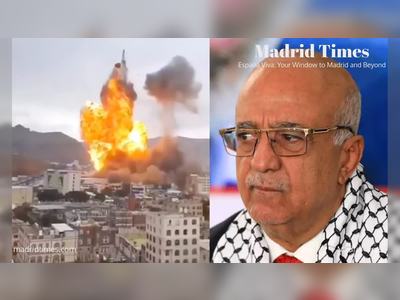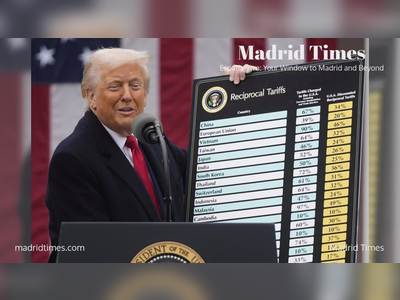"Can You Hit Moscow?" Trump Asked Zelensky To Make Putin "Feel The Pain"
U.S. to supply Patriot missiles as Trump expresses frustration with Putin's refusal to negotiate.
U.S. President Donald Trump has indicated a shift in his approach regarding the ongoing conflict in Ukraine, expressing disappointment with Russian President Vladimir Putin's handling of the situation.
During a recent call with Ukrainian President Volodymyr Zelensky, Trump reportedly inquired about the feasibility of striking deep into Russian territory, specifically mentioning targets in Moscow and St. Petersburg.
Zelensky affirmed that Ukraine could carry out such strikes if provided with the adequate weaponry.
While the specifics of U.S. military support remain uncertain, Trump confirmed the shipment of Patriot air defense missiles to Ukraine, stating they are essential for the country's defense against ongoing Russian aggression.
This announcement follows a period of growing frustration for Trump with Putin, particularly concerning the latter's apparent disregard for calls for a ceasefire and continued military operations in Ukraine.
Trump’s current stance appears to mark a departure from his earlier approach, which suggested a diminished U.S. involvement in the conflict.
In the context of escalating hostilities, Trump has set a 50-day ultimatum for Moscow to end its military operations or face intensified sanctions from the United States.
The Kremlin has responded to Trump's recent remarks, cautioning that the provision of enhanced military support to Ukraine, coupled with threats of sanctions against Russia, might only exacerbate the conflict.
Kremlin spokesman Dmitry Peskov indicated that such actions would not foster a conducive environment for peace negotiations, referencing that they might be perceived as an endorsement for continued warfare rather than a push towards dialogue.
Despite Trump’s overture for more substantial military assistance to Ukraine, Russia has firmly rejected calls for a ceasefire, continuing a pattern of increased drone and missile strikes against Ukrainian targets.
The conflict, which has persisted for nearly four years, remains a focal point of international concern, complicating diplomatic efforts aimed at achieving a resolution.
During a recent call with Ukrainian President Volodymyr Zelensky, Trump reportedly inquired about the feasibility of striking deep into Russian territory, specifically mentioning targets in Moscow and St. Petersburg.
Zelensky affirmed that Ukraine could carry out such strikes if provided with the adequate weaponry.
While the specifics of U.S. military support remain uncertain, Trump confirmed the shipment of Patriot air defense missiles to Ukraine, stating they are essential for the country's defense against ongoing Russian aggression.
This announcement follows a period of growing frustration for Trump with Putin, particularly concerning the latter's apparent disregard for calls for a ceasefire and continued military operations in Ukraine.
Trump’s current stance appears to mark a departure from his earlier approach, which suggested a diminished U.S. involvement in the conflict.
In the context of escalating hostilities, Trump has set a 50-day ultimatum for Moscow to end its military operations or face intensified sanctions from the United States.
The Kremlin has responded to Trump's recent remarks, cautioning that the provision of enhanced military support to Ukraine, coupled with threats of sanctions against Russia, might only exacerbate the conflict.
Kremlin spokesman Dmitry Peskov indicated that such actions would not foster a conducive environment for peace negotiations, referencing that they might be perceived as an endorsement for continued warfare rather than a push towards dialogue.
Despite Trump’s overture for more substantial military assistance to Ukraine, Russia has firmly rejected calls for a ceasefire, continuing a pattern of increased drone and missile strikes against Ukrainian targets.
The conflict, which has persisted for nearly four years, remains a focal point of international concern, complicating diplomatic efforts aimed at achieving a resolution.
Translation:
Translated by AI
AI Disclaimer: An advanced artificial intelligence (AI) system generated the content of this page on its own. This innovative technology conducts extensive research from a variety of reliable sources, performs rigorous fact-checking and verification, cleans up and balances biased or manipulated content, and presents a minimal factual summary that is just enough yet essential for you to function as an informed and educated citizen. Please keep in mind, however, that this system is an evolving technology, and as a result, the article may contain accidental inaccuracies or errors. We urge you to help us improve our site by reporting any inaccuracies you find using the "Contact Us" link at the bottom of this page. Your helpful feedback helps us improve our system and deliver more precise content. When you find an article of interest here, please look for the full and extensive coverage of this topic in traditional news sources, as they are written by professional journalists that we try to support, not replace. We appreciate your understanding and assistance.











